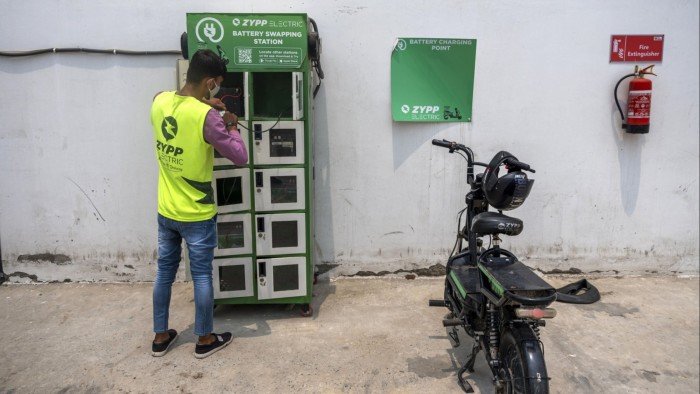Venture capital investors are placing bets on start-ups which allow drivers to swap depleted batteries for fresh ones in five minutes or less, making them suitable for smaller delivery vehicles in dense urban areas.
Battery swapping is dominated in China by Shanghai-based electric vehicle maker Nio, while CATL, the world’s biggest battery maker, has launched a collaboration to roll out a network of 1,000 stations. Europe and the US, where the cost of building the network and making vehicles compatible is high, have been slower to adopt the technology.
But backers of smaller entrants in markets from India and Japan to Spain and Taiwan believe swappable batteries could plug a gap in charging capacity in areas where grids are ill-suited to the high power requirements of fast charging stations. Charging up the batteries can also be done at the times of day when energy is cheaper, including from renewable sources.
Japanese truck and bus company Mitsubishi Fuso and carmaker Mitsubishi Motors last month said they would equip some vehicles in Tokyo with swappable batteries from San-Francisco based start-up Ample, which is also backed by Blackstone and energy groups Repsol and Shell.
The move follows pilot schemes in Kyoto with Yamato, Japan’s largest logistics company, popularly known by its black cat logo, and Uber drivers in the San Francisco Bay Area.

Ample says its modular batteries can be swapped into an EV equipped with its adapter plate — which is not a standard fitting — and that its swapping sites can be assembled in three days in car parking spaces.
European carmaker Stellantis last month said it would use Ample’s batteries in a carpooling initiative in Madrid. The project, which is backed by the Spanish government, aims to demonstrate the technology’s comparable costs and range to conventional charging stations.
By addressing air pollution and allowing for recharging in dense cities where drivers do not have the space or time to join snaking queues, the schemes are attractive to governments that feel they have a problem they “had to solve”, says Nakul Zaveri, co-head of climate strategy at Leapfrog Investments, a private equity firm which is backing the business model.
The firm led the funding round last year for Battery Smart, India’s largest battery-swapping network for electric two- and three-wheel vehicles which is also backed by MUFG bank and Panasonic. Californian private equity firm Rising Tide Energy led the most recent June capital raising.

Battery Smart says it makes 3.5mn swaps a month, providing lithium-ion batteries on a pay-per-use basis for drivers of electric scooters and rickshaws, who scan a QR code on the battery to make a swap at stations in 50 cities.
Focused on scooters, mopeds and motorcycles, Nasdaq-listed Taiwanese company Gogoro makes about 12mn swaps a month. The company, which has struggled with increasing losses, has raised $480mn over five funding rounds, including the most recent tranche from Castrol last year.
The system holds most promise for small and light vehicles such as motorcycles in dense cities, where riders do not want to wait for a full charge and their batteries are small and easy to swap, says Heather Thompson, chief executive of the New York-based non-profit Institute for Transportation & Development Policy.
Companies and researchers are still in a “pilot phase”, aiming to determine whether technologies for fast charging or battery swapping will be the most effective, says Thomson, adding: “It all comes down to a comparison of cost factors related to size, weight and time.”
Swapping may be less effective for heavier vehicles, where the battery for a bus could weigh as much as the rest of the vehicle, she noted.

Analysis from BNP Paribas also suggests that swapping providers will only be viable once demand has increased to the extent that roughly a third of EV drivers in a given market are using the service.
The companies must also face the issue of securing a supply of batteries and components in competition with the China-dominated supply chain.
The advent of ultrafast charging stations, such as BYD’s promised five-minute charge, could further undermine prospects. “Charging infrastructure and charging speeds will make services like this redundant before they even hit the road,” said auto analyst Matthias Schmidt.
Ample chief executive Khaled Hassounah argues the service will merit its place in the market. Conventional charging is “perfect” if you can charge your car or vehicle overnight, he said.
“But if you park in the street, or are part of a large fleet, you’re going to need a different solution,” he added. “The problem is availability of power and the economics of installing fast chargers.”
Additional reporting by Gloria Li





